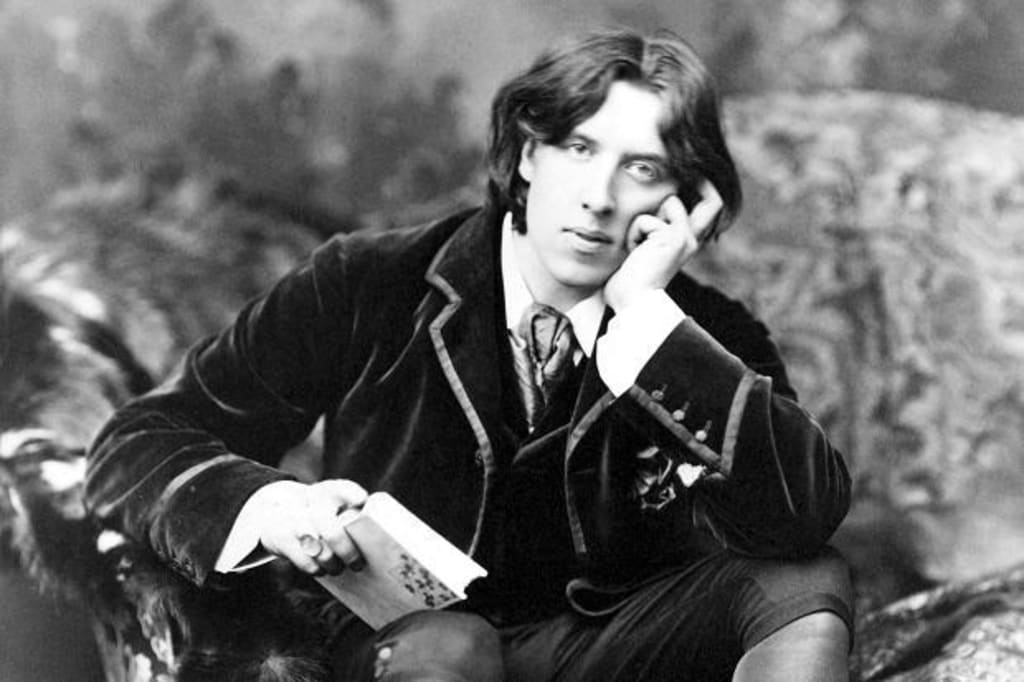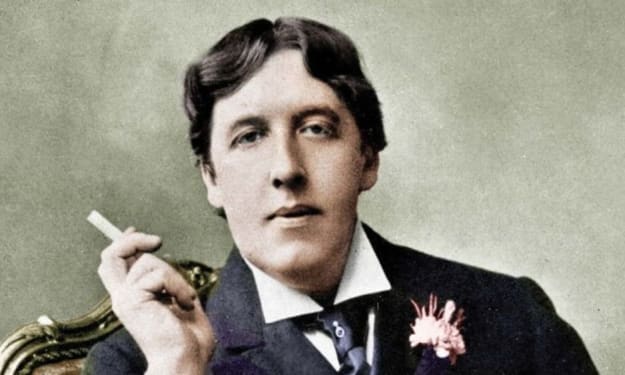'The Picture of Dorian Gray' by Oscar Wilde (Pt. 4)
Part 4: Comparisons and Conclusions

We are now going to look at ThePicture of Dorian Gray in comparison to two other texts presenting to us the destruction of character. Dorian is a tragedy, that much is true, but we will look at other seminal texts that present this to us regarding before and after the writing of the book. This will be in order to examine how Dorian's character has changed the way in which literature writes the tragic character and themes to do with how the tragic character is presented to us.
The first character we're going to compare Dorian to is Marlowe's Faustus. Christopher Marlowe's Dr. Faustus had been, by Wilde's day, already reworked into a poem by Goethe entitled Faust. But, there's nothing quite like the dark, looming and dreary Faustus of Marlovian Tragedy and so, this is the one we will compare to Dorian.
Marlowe's Faustus seems to be partially the inspiration behind the pact that Dorian has made with the painting and, seemingly the influence for much of his character. Just as Dorian destroys the painting that has plagued him so much with the want for youth, Faustus states that he will "burn (his) books" in order to get rid of what has plagued him with the want for power. They both have similar pacts with the want for something, someone helps them get there; in Dorian's case it is Henry, in Faustus' case it is Mephistopheles, and then they fall into tragedy. This tragedy is catalysed by the very thing that they sought in the beginning, got in the middle and suddenly don't want anymore. Dorian is basically Victorian Decadence's answer to Marlowe's Faustus and even goes as far as to lose a female love because of alienation. For Marlowe's Faustus this is Helen of Troy, for Goethe's Faust it is Gretchen and for Wilde's Dorian it is Sybil Vane.
In Marlowe's Faustus, there are also three sides, they are stated in Robert West's article for the Journal of the English Literary Renaissance as "God, Adversary and Man". This can also be said for Dorian, as there are constantly three sides being played out at one time. In one case, it is Basil, Henry and Dorian acting as God, Adversary and Man. In another case it is Sybil, Dorian and James acting as God, Adversary and Man and, in the final case it is Dorian's conscience, Dorian as Henry has influenced him and Dorian the person—and only when this final one happens can Dorian finally commit to killing himself.
Therefore, Marlowe's Faustus and Wilde's Dorian are two mirroring characters that rise and fall by the very same structure; both modelling the Marlovian Tragedy. One is in set in the Medieval/Renaissance eras, which means that his pact is suited for his time as blasphemes etc. are committed. The other is suited to more modern eras where far more shocking events take place. Both must destroy what has plagued them and this results in their own deaths.
The next character we will look at when comparing Dorian to another person is Frankenstein, the protagonist and majority narrator of the novel of the same name.
Frankenstein as a novel is modelled on the Shakespearean Tragedy, much like Dorian's story is modelled on the Marlovian Tragedy. But, the main focus is the success of the protagonists.
As we know, a tragedy tends to mean that the main character will die, this means that they aren't successful as the protagonist because they don't live to see the aftermath of the novel. Not only this, but they also don't succeed in their life aspirations. As Frankenstein is completely aware of his downfall since he tells his own story before dying, Dorian is not aware until the final chapters of the novel.
In her article Frankenstein; or the Modern Protagonist, Anna Clark states that:
"...Any character who is too central, who, in effect, inhibits our ability to identify with other characters, is himself not completely successful as a protagonist."
Therefore, the characters of Dorian and Victor are both failed protagonists. They both hinder our identification with other characters because of their alienation from them. Dorian alienates himself from Basil, so every time we see Basil in the novel we are unable to understand him because Dorian has either cut Basil from his life or has a warped view of him, influenced by Henry being Basil's complete opposite.
Victor alienates himself from everyone and therefore, when it comes to the Monster's narrative, we have a disillusioned view of the Monster as some hideous and odious being as opposed to a misunderstood creature who has no choice than to react violently to small issues.
Victor and Dorian both symbolise the character that only realises their own mistakes after the deed has been done. For Victor, this deed is the making of the monster and for Dorian, this deed is the murder of Basil Hallward.
For Victor and Dorian, they have the same luck when it comes to love and marriage. In the novel Frankenstein, it is known that Victor is set to marry the sympathetic Elizabeth Lavanza—yet after the making of the monster and the near-completion of another mistake, The Monster breaks in through the window and rips Elizabeth apart, killing her. Thus, it shows that the very thing that Victor created came back to take what he loved from him. The very thing he wanted has turned on him as a result of his carelessness.
Dorian is similar. Dorian falls in love with the actress Sybil Vane and is due to marry her. Only when he takes Basil and Henry to see a play she is acting in does she act terribly. Dorian then uses his power of youth, charm and selfishness to dismiss her and calls off their relationship. Upset and broken, Sybil takes to drowning herself and taking her own life. An image that is so close to Hamlet's Ophelia. Again, it is Dorian's carelessness for emotions that leads him to impress this upon Sybil Vane.
These two characters represent the mistakes of influence. Victor is influenced by the trauma he experienced in his youth and Dorian is influenced by the book, "A Rebours," that Henry (rumoured) gives to him.
The next novel we are going to explore in connection to Dorian's character is Susskind’s Perfume: Story of a Murderer. There is a slight difference between the two characters and that is that Dorian is influenced by a person and Jean-Baptiste is influenced by an idea.
Even though there is a great sense in Wilde's novel that Wilde is pretty much against what Dorian is doing, there is a great sense in Suskind's novel that Suskind is trying to promote Jean-Baptiste's actions to the reader. Suskind writes:
"For people could close their eyes to greatness, to horrors, to beauty, and their ears to melodies or deceiving words. But they could not escape scent. For scent was a brother of breath. Together with breath it entered human beings, who could not defend themselves against it, not if they wanted to live. And scent entered into their very core, went directly to their hearts, and decided for good and all between affection and contempt, disgust and lust, love and hate. He who ruled scent ruled the hearts of men..."
The fact that Jean-Baptiste's entire idea is to do with gaining Godly status from using the sense of smell, Suskind is trying to get the reader to also believe in the idea. Whereas, Wilde is trying to condemn Dorian's actions:
"It was better not to think of the past. Nothing could alter that. It was of himself, and of his own future, that he had to think. James Vane was hidden in a nameless grave in Selby churchyard. Alan Campbell had shot himself one night in his laboratory, but had not revealed the secret that he had been forced to know. The excitement, such as it was, over Basil Hallward's disappearance would soon pass away. It was already waning. He was perfectly safe there. Nor, indeed, was it the death of Basil Hallward that weighed most upon his mind. It was the living death of his own soul that troubled him."
The difference in narration is eminent. But the similarity in character is strange enough. Both protagonists have no conscience throughout the story and only begin to have one after one particular idea or event. For Dorian, of course, this is the death of Basil, which for the rest of the novel he will pretend as if he doesn't care about. For Jean-Baptiste, this is when he finally makes the perfume and then, experiences dreaded loneliness that is absolutely stifling. Both characters then proceed to get rid of themselves using the very thing that they believe has "marred (their) lives".
For Dorian, he simply stabs the painting to get rid of the other self and thus, end his own suffering. For Jean-Baptiste, he symbolically pours the perfume over himself and the crowd devours him—killing himself using something he believed the crowd had done "out of love." Both are ridding themselves of suffering and both deaths are so symbolic of the actions they have committed through life.
Here are the final lines to each novel and you can only see how similar they are in symbolism, yet how different they are in their message about the main character. Here's Perfume:
“But to eat a human being? Tthey were amazed it had been so very easy for them. . .perhaps that was why they were shy about looking up and gazing into one another’s eyes. . .When they finally did dare it. . .they had to smile. They were uncommonly proud. For the first time they had done something out of love”
And here's The Picture of Dorian Gray:
"When they entered, they found hanging upon the wall a splendid portrait of their master as they had last seen him, in all the wonder of his exquisite youth and beauty. Lying on the floor was a dead man, in evening dress, with a knife in his heart. He was withered, wrinkled, and loathsome of visage. It was not till they had examined the rings that they recognized who it was."
Perfume takes a more sympathetic look at the protagonist because of Jean-Baptiste's rough upbringing and lack of humaneness. Whereas, The Picture of Dorian Gray takes the time to insult Dorian's horrid looks now that he's swapped places with the painting again and is finally dead.
In conclusion, the authority of influence that Henry has over Dorian leads to an immense character change and a committal to themes and types most commonly known in the book Henry gives to Dorian, (rumoured to be) A Rebours. The authority of Lord Henry begins to die away when Dorian takes matters into his own hands and murders Basil. When the murder of Basil comes about, Henry doesn't know Dorian did it and is upset so that he tells people to look for Basil. But, when chapter 19 comes around it is clear that all of Henry's influence was to make Dorian think, not necessarily act. But, Dorian acted on impulse and, in the same chapter, Henry explains that Dorian hasn't changed a single bit—unable to live a life of aesthetic pleasure with no substance, Dorian stabs the painting and kills himself. This influence is possibly a psychological game in order to get Dorian to admit to sins he has committed. Lord Henry states that Dorian has retained himself all this time and not changed a bit, even though three people have died, all of them died because of Dorian and many things have gone wrong in the process. They have changed Dorian from the inside and—Lord Henry's final piece of influence that Dorian hasn't changed a bit could be taken as a compliment to the character, or as a last warning that Dorian actually has no personality of his own—it is all the authority of influence.
About the Creator
Annie Kapur
200K+ Reads on Vocal.
English Lecturer
🎓Literature & Writing (B.A)
🎓Film & Writing (M.A)
🎓Secondary English Education (PgDipEd) (QTS)
📍Birmingham, UK






Comments
There are no comments for this story
Be the first to respond and start the conversation.